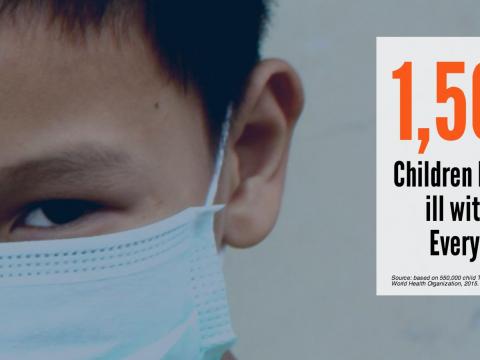Cambodia needs vigilance to prevent further spread of Tuberculosis

By: Mary Mohan, Senior Program Manager for Health and Nutrition
As countries around the globe mark World Tuberculosis (TB) Day on 24 March, it is important that the public be made aware and more vigilant in recognizing, understanding and preventing further spread of the disease.
“Tuberculosis is treatable and can be cured. But it needs discipline to complete the full course of treatment, which usually lasts for 6 months,” says Dr. Kyi Minn, a TB health expert working for World Vision.
The concern, however, is that poverty often prevents many from reporting for the free daily TB treatment, as the need to earn an income outweighs the desire to fully recover.
Cambodia’s TB prevalence rate is the highest in Asia, with 715 infections per 100,000 people.
“When a person does not finish the full treatment cycle, they are at increased risk of developing drug resistant tuberculosis. This further increases their risk of infecting others as well” says Dr. Minn.
Cambodia’s TB prevalence rate is the highest in Asia, with 715 infections per 100,000 people. People are more likely to get infected with TB in Cambodia, than any other country in Asia. The most recent WHO statistics indicate that a total of 110,000 TB cases, were documented in Cambodia, in 2013.
When a person develops active TB, the symptoms of cough, fever, night sweats, weight loss, may remain mild, sometimes dormant, for many months. This can lead to delays in seeking care, and results in silent transmission of the bacteria to others. WHO states that, people with TB can infect up to 10-15 other people, through close contact, over the course of a year.
One of the most vulnerable groups for contracting TB is ‘young children’ who do not have a well-developed immune system. It is also very difficult to diagnose TB in children. Children under 5 years cannot easily communicate their symptoms, but their mothers notice poor appetite, lethargy and a steady loss of weight in their children, which can be alarming.
“Despite poor statistics about the number of children infected with tuberculous, it is important that parents understand how to prevent their children from getting infected with TB, through active promotion of clear messages that relate to TB prevention” says Dr. Mary Mohan, senior program manager at World Vision International Cambodia.
The chronic loss of weight and resulting malnutrition caused by tuberculous, coupled with a lack of awareness of the signs and symptoms, delayed treatment, poor diet and unsafe water, remain a constant threat to proper physical and cognitive development of young children, says Dr. Mohan.
Therefore, the focus should be on raising public awareness about the prevention, transmission and treatment of TB. This requires a collaborative effort, intent and interventions not only from government, but also from local authorizes and civil society, in actually making it happen.